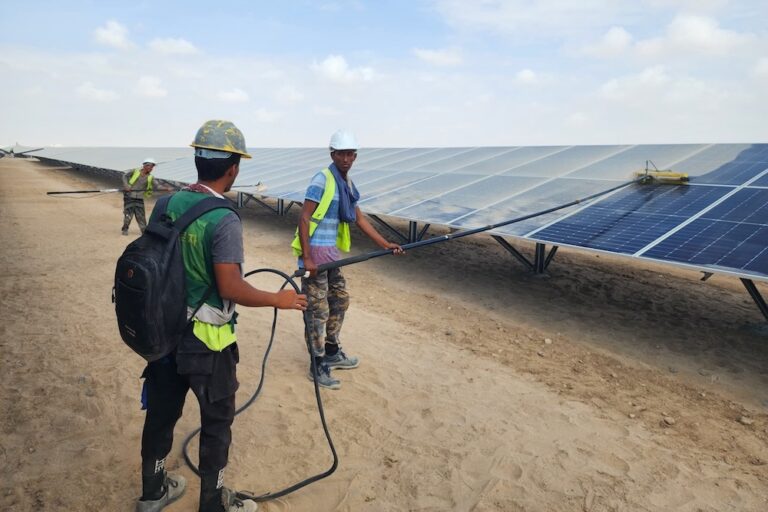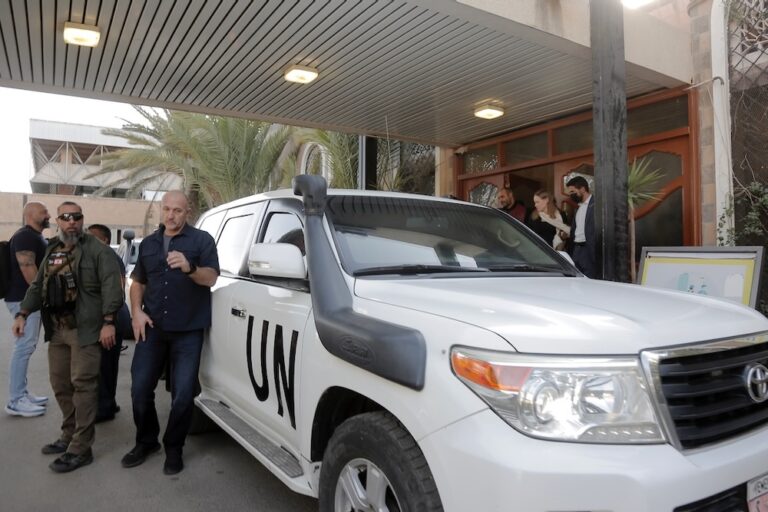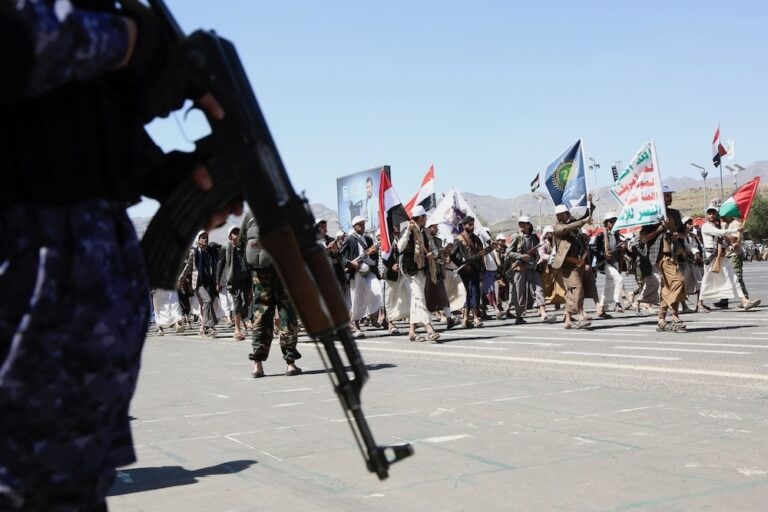(CPJ/IFEX) – The following is a 17 May 1999 CPJ press release: **Updates IFEX alerts of 17 May, 14 May and 4 March 1999** For Immediate Release CPJ Condemns Yemen’s Clampdown on the Press Letter to President Saleh Urges End to Arrests and Legal Harassment of Journalists New York, N.Y., May 17, 1999-The Committee to […]
(CPJ/IFEX) – The following is a 17 May 1999 CPJ press release:
**Updates IFEX alerts of 17 May, 14 May and 4 March 1999**
For Immediate Release
CPJ Condemns Yemen’s Clampdown on the Press
Letter to President Saleh Urges End to Arrests and Legal Harassment of
Journalists
New York, N.Y., May 17, 1999-The Committee to Protect Journalists (CPJ)
today urged the government of Yemen to immediately halt its clampdown on
independent and opposition journalists, which in recent months has included
the prosecutions of six newspapers for their published criticisms of
authorities. Since February, authorities have taken a series of other
punitive measures against journalists, including the arrest of editors and
reporters, the suspension and censorship of publications, and extra-legal
harassment of journalists by security forces and presumed state agents.
“This recent spate of attacks on the press in Yemen has created a formidable
climate of intimidation for all journalists,” said CPJ’s executive director,
Ann K. Cooper. “We call on President Saleh to take the lead in reversing
this sharp deterioration in press freedom.”
Since February, at least three journalists have been arrested, a leading
London-based newspaper banned, and an editor severely beaten by unknown
assailants.
One of the six papers now being prosecuted, the independent Al-Ayyam, faces
indefinite closure if convicted of instigating “national feuds,” “the spirit
of separatism,” and harming “national unity.” The charges were brought on
May 15 against editor Hisham Basharaheel and journalist Ali Haitham al
Ghareeb, for a February article criticizing the structure of local
government in which southern provinces are governed by politicians from the
north of the country. Since Yemen’s 1994 civil war, tensions between north
and south have often focused on issues of governance and regional political
dominance.
A copy of the letter is attached.
The Committee to Protect Journalists is an independent, nonprofit
organization that works to safeguard press freedom around the world. Visit
CPJ’s Website at .
BY FACSIMILE
May 17,1999
His Excellency President Ali Abdullah Saleh
c/o His Excellency Ambassador Abdul Wahab al-Hajjri
Embassy of the Republic of Yemen
2600 Virginia Avenue, N.W.
Washington, DC 20037
Your Excellency:
The Committee to Protect Journalists (CPJ) is writing to express its grave
concern about the alarming pattern of government restrictions on press
freedom in Yemen in recent months, which violate international standards for
free expression. As of this writing, six independent and opposition
newspapers are facing trial in the court of first instance in response to
their publication of news and opinion on a variety of domestic topics. And
during the past four months, authorities have taken a series of punitive
measures against
journalists, including the arrest of editors and reporters, the suspension
and censorship of publications, and extra-legal harassment by security
forces and presumed state agents.
Most recently, on May 15, Hisham Basharaheel, editor in chief of the
thrice-weekly newspaper Al-Ayyam, and Ali Haitham Ghareeb, a writer for the
paper, were charged in the Aden court of first instance with instigating
“national feuds,” “the spirit of separatism,” and harming “national unity.”
The charge against both men stems from an article by Ghareeb published in
the February 27, 1999 edition of Al-Ayyam, titled “Let’s Talk About Unity
from the Social Perspective.” The article contained criticism of
factionalism in Yemeni society and specifically criticized the structure of
local government in which southern provinces are governed by politicians
from the north of the country.
Yemeni security authorities arrested Ghareeb on March 2 at his home in Khor
Maksar, in Aden. He was first taken to the Criminal Investigations
Department and then transferred to Mansourah Central Prison, where he was
held for five days. On March 4, Basharaheel was summoned by state
prosecutors and questioned for four hours about the article.
Basharaheel has also been charged with violating a January 1999 court order
banning the publication of court proceedings of the trial of a group of
British nationals who, at the time, were facing terrorism charges in Aden.
The article, published on March 3, 1999, and titled “Lawyer Hmeidan Calls
for Dismissal of Trial of Her British Clients on Account of Improper Legal
Proceedings,” summarized a story by the British Broadcasting Corporation
(BBC), which reported that the lawyer for the eight men had urged that their
cases be dismissed on procedural grounds.
Hearings in the trial of Basharaheel and Ghareeb are expected to resume
later this week. If found guilty, both men face possible fines and Al-Ayyam
faces indefinite closure.
In addition to Al-Ayyam, prosecutions are pending against five other weekly
newspapers in the court of first instance in Sanaa for alleged publications
offenses or for unspecified charges. The papers are: Al-Shoura, Yemen Times,
Al-Rai al-Aam (currently suspended by authorities), Al-Thawri, and Al-Haq.
Some of the charges have been filed by authorities in response to the
newspapers’ coverage of alleged government impropriety and other sensitive
social issues, while in other cases, authorities have yet to formally
present the defendants with specific charges. Journalists from these papers,
however, believe that the cases stem from their published news and
commentary which has been critical of the Yemeni government. Several
newspaper representatives are scheduled to attend court hearings in Sanaa
tomorrow.
The recent flurry of prosecutions against journalists has occurred against
the backdrop of a sharp decline of press freedom in Yemen in recent months.
This deterioration has helped to create a formidable atmosphere of
intimidation for all members of the profession. Over the past several weeks,
CPJ has documented the following cases of government (and suspected
government) interference with the press:
*On January 30, 1999, the first instance court in Al- Mina ordered Yemeni
newspapers to halt coverage of the proceedings of the trial of a group of
British nationals who, at the time, were facing terrorism charges in Aden.
Some newspaper editors told CPJ that the court’s ruling forced them to
attribute reporting on the trial to foreign news sources and dispatches.
*On February 23, 1999, security authorities in Sanaa arrested No’aman Qaid
Seif, editor in chief of the opposition weekly Al-Shoura, accusing him of
“disseminating false information” in a February 21 article titled “The
President is Urged to Fight Corruption.” The article called on Your
Excellency to end alleged government corruption and to respect human rights.
Seif was held overnight in the Criminal Investigations Department before his
release. He is expected to appear in court tomorrow, although authorities
have yet to specify charges against him.
*On February 25, 1999, the Ministry of Information issued a decree ordering
the closure of Al-Shoura, saying that two newspapers under the same title
were publishing concurrently in violation of the press law. According to
journalists from the paper, authorities had helped finance the second
version of Al-Shoura as a subterfuge. The March 5 issue of Al-Shoura was
also banned under the same pretext, according to editors at the paper.
*Authorities banned distribution of the February 27, 1999, issue of the
London-based daily Al-Sharq al-Awsat in apparent response to its coverage of
Yemeni affairs. The edition had carried several articles on Yemen, including
one which discussed Russian arms sales to Yemen and hinted that Yemen may be
preparing to transfer arms to its ally Eritrea. In early March, the Ministry
of Information banned the publication indefinitely. According to Al-Sharq
al-Awsat, no reason was given for the action, although authorities told the
paper that it had printed “incorrect” information. The newspaper resumed
circulation in Yemen in early May, according to editors.
*On March 2, 1999, Abdel Latif al-Kutbi Omar, the 68 year-old editor in
chief of the opposition weekly Al-Haq, was arrested at his Sanaa office by
five armed plainclothes agents and was taken to the Criminal Investigation
Department for interrogation. Journalists suspect that his arrest came in
response to an article published in Al-Haq on February 28, titled “Socotra
Prepares to Offer its Services to American Forces,” although no reason for
his arrest was given. The February 28 story reported that Yemeni authorities
had initiated plans to offer military facilities to the United States on the
island of Socotra under a military co-operation agreement between the two
countries. Omar was released on March 6 after three days in custody.
Recently, he was informed by judicial
authorities that he would be prosecuted, although it was not specified on
what grounds. Omar is expected to appear in court tomorrow.
*At about eight o’clock on the evening of May 10, 1999, four armed, masked
men stormed the Sanaa home of Saif al-Hadheri, the editor in chief of the
weekly Al-Shumua’, and brutally beat him before fleeing the scene. Hadheri
was taken to the hospital and is currently recovering from his injuries.
The Committee to Protect Journalists, a nonpartisan organization of
journalists dedicated to defending press freedom worldwide, views these
incidents as grave threats to freedom of expression in Yemen and as flagrant
violations of international standards for press freedom. Article 19 of the
Universal Declaration of Human Rights guarantees journalists the right to
“seek, receive, and impart information and ideas through any media and
regardless of frontiers.”
CPJ urges Your Excellency to adopt the following recommendations aimed at
bringing Yemen’s practices in conformity with international standards for a
free press:
Guarantee the right of journalists to report news and opinion without state
reprisal, including the dissemination of a diversity of views, even if these
views are opposed to or critical of prevailing state policies;
Cease all state prosecutions of journalists in response to their publication
of news and opinion;
Halt the arrest and detention of journalists in response to their
publication of news and opinion;
End state censorship of foreign publications and the suspension of local
papers;
End all extra-judicial harassment of journalists by security forces and
state agents;
Launch an immediate and thorough investigation into the May 10 attack on
Seif al-Hadheri and make its findings public.
Thank you for your attention to these important matters. We look forward to
your prompt reply.
Sincerely,
Ann K. Cooper
Executive Director
cc:
His Excellency Abdel Karim al-Iryani.
His Excellency Abdel Rahman al-Akwaa
His Excellency Ambassador Abdul Wahab al-Hajjri
Newspaper Association of America
American Society of Newspaper Editors
Amnesty International
ARTICLE 19
Canadian Journalists for Free Expression
Freedom House
Human Rights Watch
Index on Censorship
International Association of Broadcasting
International Federation of Journalists
International Federation of Newspaper Publishers
International Journalism Institute
International PEN
International Press Institute
National Association of Black Journalists
National Press Club
The Newspaper Guild
North American Broadcasters Association
Reporters Sans Frontieres
Overseas Press Club
The Society of Professional Journalists
World Press Freedom Committee
Recommended Action
Similar letters can be sent to:
Appeals To
His Excellency Ali Abdullah Saleh
President of the Republic of Yemen
Sana’a, Yemen
Fax: + 967 1 246 201or
c/o His Excellency Ambassador Abdul Wahab al-Hajjri
Embassy of the Republic of Yemen
2600 Virginia Avenue, N.W.
Washington, D.C. 20037
U.S.A.
Fax: +202 337 2017
Please copy appeals to the source if possible.


